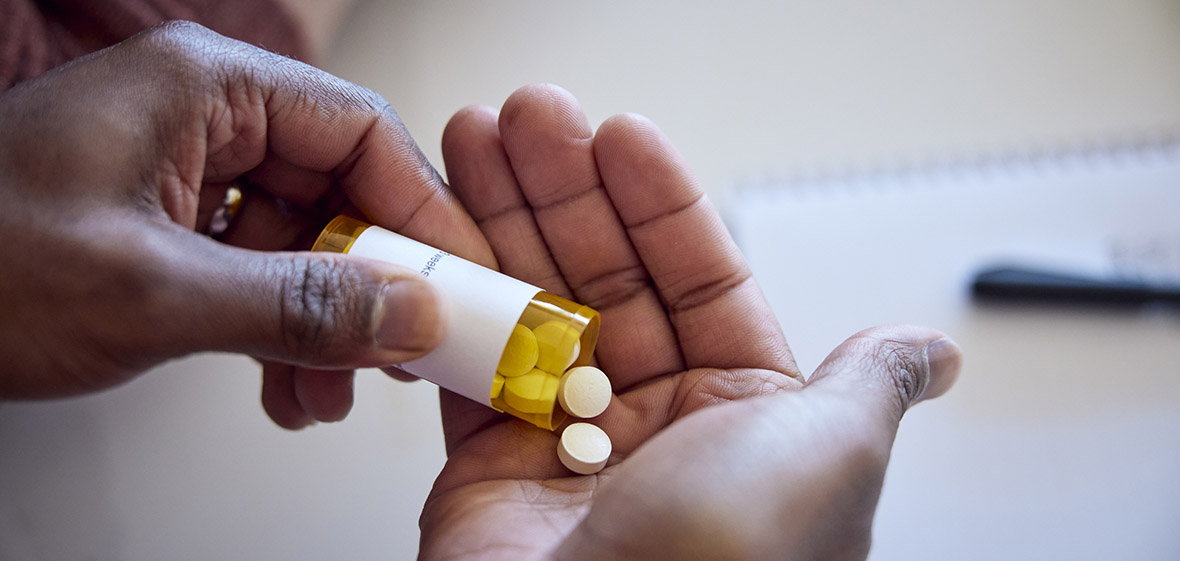
- Are generic and brand-name drugs the same?
Generic medications contain the same active ingredient as their brand-name counterparts but typically cost a lot less. Generic drugs are subject to the same manufacture and quality measures as the brand-name medications. However, generic medications can have different inactive ingredients so they may be a different color, shape or size.
- What vaccines should I get?
Recommended immunizations depend on your age, health conditions, lifestyle, job or travel.
Most adults should receive an influenza (flu) vaccine every year. Adults also need to stay up-to-date on their tetanus or Tdap (tetanus, diphtheria and pertussis) and COVID-19 vaccines.
Adults who are susceptible to hepatitis or exposure to blood or body fluids need hepatitis B immunization. Pneumonia (pneumococcal) and shingles (zoster) vaccines are recommended for those with increased risk factors, including older age, other health conditions or taking medications that may lower the immune system’s response.
It is always best to discuss immunizations with your providers or pharmacists as your health and immunization guidelines change over time. Great resources to learn more about vaccines include:
- https://www.CDC.gov/Vaccines/
- https://www.CDC.gov/Vaccines/Partners/Vaccinate-with-Confidence.html
- https://www.CDC.gov/Vaccines/Partners/Routine-Immunizations-Lets-Rise.html
- What vitamins/supplements should I take?
This also depends on your individual health conditions and risks. If you are healthy and eat a well-balanced, healthy, low-processed diet, you may not need any vitamins. Certain surgeries, health conditions and medications may block the absorption or activity of important vitamins, which may need to be replaced with supplements.
It is important to remember that all vitamins and supplements have the potential to cause side effects and drug interactions. There are certain vitamins that can even have toxicity or serious side effects when taken in high doses (iron, vitamin K, vitamin D).
Additionally, vitamins and supplements are not regulated by the FDA or have as strict manufacturing requirements as medications. Thus, the quality and strength of these may vary between products and even between the same manufactured product.
Always discuss vitamins and supplements with your health care team. Pharmacists are great resources as well!
- Where should I store my medications?
Most medications should be stored in dry, room temperature-controlled areas and out of the reach of others (children, visitors and pets). Do not store your medications (and certain supplies) in your car or other areas where temperatures are not controlled. Many medications, such as insulin, require refrigeration and have varying time limits of how long they can stay at room temperature or used once open.
There are certain medications dispensed in special containers, such as blister packs, devices or kits. Special packaging helps keep the medication stable and working correctly, helps with appropriate medication delivery and helps protect people from being exposed to the medication.
- How can I get rid of old medications?
Dispose of old medications or medications you are no longer using at an approved medication disposal box or drop-off site. To find a medication disposal box location or drop-off site near you, use the online locator or call the Drug Enforcement Administration (DEA) Diversion Control Division Registration Call Center at 800-882-9539.
Talk to your pharmacist about alternative disposal methods if you are unable to access one of these medication disposal boxes or drop-off sites. Additional resources for proper at-home medication disposal can be found here: www.FDA.gov/Consumers/Consumer-Updates/Where-and-how-Dispose-Unused-Medicines.
The following link will provide local drug take back locations: www.DEATakeBack.com.
Never flush medications down toilets or sinks, as these make their way to our water systems and can be harmful to others. Never dispose of needles or used sharps in regular trash or recycle bins. Speak to your pharmacist about other safe ways to dispose of medications since there may be specific instructions based on the type of medication.
- What should I do if the pharmacy does not have my medication in stock?
This is becoming more and more common! Talk with your pharmacist about when they expect to get the medication back in stock and what alternatives they have in stock.
Discuss with your provider if any alternatives would be appropriate for you. Be cautious of switching your medications to different pharmacies to find medications in stock as this can lead to errors and gaps in therapy. The FDA has an online website where it posts drug shortages and updates of when backorders are projected to end: https://www.FDA.gov/Drugs/Drug-Safety-and-Availability/Drug-Shortages.
- What is the best way to keep up with my medication list?
It is best to have a list of your medications with their indication, which provider prescribed them, strength and how you take them. You can ask your pharmacist or provider to help you with this list. Take this list to any provider appointment and update regularly with any changes.
- Can I stop taking a medication if it is not working or if I have a side effect?
Never stop taking a medication without discussing it with your provider. Certain medications can have serious side effects if abruptly stopped. You can discuss side effects with your provider or pharmacist.
Of course, if you ever have a serious reaction, such as difficulty breathing or swelling of your mouth, tongue or airways, seek immediate medical attention. Be sure to notify your provider of the serious reaction so that your medical records can be updated.
Most medications have side effects. Side effects range from mild and expected side effects to less common and serious. Many side effects are bothersome but not serious and they may even improve as your body gains tolerance to the medication.
Always discuss potential medication side effects with your provider and pharmacist.
- I forgot to take my medication. What should I do?
Every medication is slightly different in how long it works in the body, so ask your pharmacist! Your local pharmacist should be able to tell you if it is safest for you to skip this dose or take the dose late. Pill planners and alarms on your phone are helpful tools to prevent missed doses.
- Can I use a discount card like GoodRX®?
Discount cards are used in place of insurance to offer discounts from the cash price of your medications. If you have insurance, generally these cards do not offer a better price than insurance.
Brand-name drugs often offer manufacture coupons to use with commercial insurance to provide additional benefits on top of your insurance. Additionally, many pharmacies offer in-house discount programs that may save you more than discount cards.
UofL Health has the following outpatient pharmacy locations for your medication and pharmacy needs:
- UofL Health – Jewish Hospital: 502-569-7902
- UofL Health – Mary & Elizabeth Hospital: 502-367-3315
- UofL Health – Peace Hospital: 502-479-4602
- UofL Health – Jackson Street Outpatient Center: 502-562-4678









